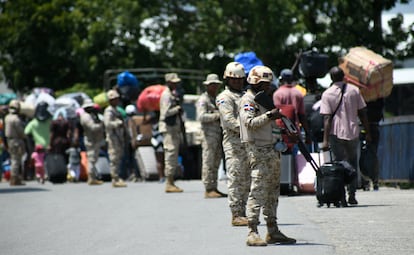Dominican Republic to close all borders with Haiti in a dispute over a canal
President Luis Abinader says air, sea, and land borders will remain shuttered ‘until necessary.’ It is a rare move, and could hit economies in both countries, though it will be most acutely felt in Haiti

The Dominican Republic’s president announced Thursday he would close all borders with neighboring Haiti starting Friday in a dispute over a canal on the Haitian side that would use water from a river along their frontier. President Luis Abinader said air, sea, and land borders would close at 6 a.m. local time Friday and would remain shuttered “until necessary,” signaling that last-minute talks between the countries had failed to head off the closure.
It is a rare move for the Dominican Republic, and could hit economies in both countries, though it will be most acutely felt in Haiti. The closure is a response to the excavation of a canal by a farming group on the Haitian side that targets waters from the Massacre River, which runs along the border shared by the two countries on the island of Hispaniola.
Abinader in recent days also suspended issuing visas to Haitians and closed the border near the northern town of Dajabon, paralyzing a key economic lifeline for Haitians who buy and sell goods there several times a week. Those who live in Haiti, but work in the Dominican Republic also cross the border daily.
“They are suffering a lot here in Dajabon, and in Haiti, too, because there are a lot of goods that are spoiling,” said Haitian businessman Pichelo Petijon. “There are millions of dollars in losses.”
Abinader accused Haiti of trying to divert water from the Massacre River, and said it would affect Dominican farmers and the environment. The river is named after a bloody clash between French and Spanish colonizers in the 1700s, and it also was the site of a mass killing of Haitians by the Dominican army in 1937.
On Wednesday, Haiti’s Ministry of Foreign Affairs said it was meeting with Dominican officials in the Dominican Republic to talk about the situation. The Dominican government said Thursday that the meeting had stretched into its second day but provided no details. The meeting was continuing when Abinader announced he would close all borders starting Friday.
Meanwhile, Jean Brévil Weston, leader of a farmers’ group near the border, was quoted by Haiti radio station Magik9 as saying that he will not stop working on the canal.
“It’s the canal or death,” he was quoted as saying. “We are ready to be buried by the canal.”
The office of Haitian Prime Minister Ariel Henry could not be immediately reached for comment.
Claude Joseph, Haiti’s former prime minister and an aspiring presidential candidate, said the excavation does not violate any agreements or treaties between the two countries, and urged workers to keep working on the project. Joseph previously clashed with Abinader over an unrelated issue, prompting the Dominican president to ban him from his country.
A line already was forming Thursday at the Dominican border town of Dajabon, with dozens of people seeking to cross into Haiti for various reasons, many with heavy bags balanced on their heads or suitcases in hand. Dominican authorities were opening the gate only three times a day, and only for crossings into Haiti.
Among those waiting to cross was a 47-year-old Haitian man who gave his name only as Egnel, who said he had a job at a banana farm in the Dominican Republic. He said he needed to return to Haiti to take one of his daughters there to the hospital, and that he was willing to take the risk of not being able to return to his job.
“My objective is to take care of my daughter,” he said.
Sign up for our weekly newsletter to get more English-language news coverage from EL PAÍS USA Edition
Tu suscripción se está usando en otro dispositivo
¿Quieres añadir otro usuario a tu suscripción?
Si continúas leyendo en este dispositivo, no se podrá leer en el otro.
FlechaTu suscripción se está usando en otro dispositivo y solo puedes acceder a EL PAÍS desde un dispositivo a la vez.
Si quieres compartir tu cuenta, cambia tu suscripción a la modalidad Premium, así podrás añadir otro usuario. Cada uno accederá con su propia cuenta de email, lo que os permitirá personalizar vuestra experiencia en EL PAÍS.
¿Tienes una suscripción de empresa? Accede aquí para contratar más cuentas.
En el caso de no saber quién está usando tu cuenta, te recomendamos cambiar tu contraseña aquí.
Si decides continuar compartiendo tu cuenta, este mensaje se mostrará en tu dispositivo y en el de la otra persona que está usando tu cuenta de forma indefinida, afectando a tu experiencia de lectura. Puedes consultar aquí los términos y condiciones de la suscripción digital.








































